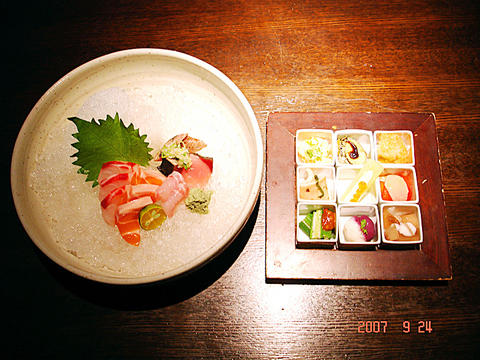Right in the heart of Taipei's fashionable Anhe Road, Shintori (新都里) is an upscale Japanese restaurant aimed at well-to-do customers with discernable tastes.
To attract customers, the restaurant spares no expense in fashioning its space with a highbrow gallery design that features granite walls and flooring and subtle lighting. The establishment has 132 seats in its public dinning area, 12 seats at the bar and 86 seats in 14 private dinning booths.
As a brand-name restaurant that targets young professionals, the joint specializes in nouveau Japanese food that blends traditional ingredients with innovative cooking techniques.

PHOTO: ANDREW HUANG, TAIPEI TIMES
For any Japanese food lover, Shintori's assorted sashimi (綜合生魚片) is a must-try. The ultra-fresh, melt-in-your-mouth pieces of fish come on a carpet of ice to preserve the fish's freshness during its journey from kitchen to table.
The rock 'n' roll salad (搖滾沙拉) is named after its serving method. The dish is brought in by the waiter who pours the house dressing into a tall glass cylinder, adds the salad and then rocks and shakes the mixture, after which it is served in a wooden bowl. The ginger dressing is also one-of-a-kind and delivers just the right savory tinge to the salad dish.
Also highly recommended is the appetizer dish cubic appetizer (九宮前菜), which consists of nine ceramic cubes containing different appetizers chosen by the chef from the day's freshest ingredients.
As a nouveau-Japanese food joint, some of the restaurant's innovative dishes are bound to backfire. Shintori's seafood rice pizza (米飯披薩) is beautiful and the idea seems tantalizing, but it tastes like it came from a fast food store.
The service is impeccable as the waiters are extremely attentive in delivering and serving the food. When the water line in your teacup dips, the house policy is to replace it with a brand new cup of tea rather than refilling the old cup. This keeps the tea at just the right temperature and is just the attitude that discerning diners appreciate.

Towering high above Taiwan’s capital city at 508 meters, Taipei 101 dominates the skyline. The earthquake-proof skyscraper of steel and glass has captured the imagination of professional rock climber Alex Honnold for more than a decade. Tomorrow morning, he will climb it in his signature free solo style — without ropes or protective equipment. And Netflix will broadcast it — live. The event’s announcement has drawn both excitement and trepidation, as well as some concerns over the ethical implications of attempting such a high-risk endeavor on live broadcast. Many have questioned Honnold’s desire to continues his free-solo climbs now that he’s a

Lines between cop and criminal get murky in Joe Carnahan’s The Rip, a crime thriller set across one foggy Miami night, starring Matt Damon and Ben Affleck. Damon and Affleck, of course, are so closely associated with Boston — most recently they produced the 2024 heist movie The Instigators there — that a detour to South Florida puts them, a little awkwardly, in an entirely different movie landscape. This is Miami Vice territory or Elmore Leonard Land, not Southie or The Town. In The Rip, they play Miami narcotics officers who come upon a cartel stash house that Lt. Dane Dumars (Damon)

Francis William White, an Englishman who late in the 1860s served as Commissioner of the Imperial Customs Service in Tainan, published the tale of a jaunt he took one winter in 1868: A visit to the interior of south Formosa (1870). White’s journey took him into the mountains, where he mused on the difficult terrain and the ease with which his little group could be ambushed in the crags and dense vegetation. At one point he stays at the house of a local near a stream on the border of indigenous territory: “Their matchlocks, which were kept in excellent order,

Today Taiwanese accept as legitimate government control of many aspects of land use. That legitimacy hides in plain sight the way the system of authoritarian land grabs that favored big firms in the developmentalist era has given way to a government land grab system that favors big developers in the modern democratic era. Articles 142 and 143 of the Republic of China (ROC) Constitution form the basis of that control. They incorporate the thinking of Sun Yat-sen (孫逸仙) in considering the problems of land in China. Article 143 states: “All land within the territory of the Republic of China shall